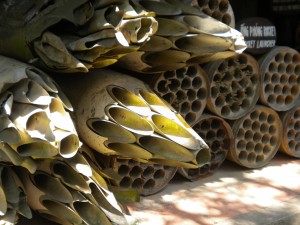There seems to be this very large, war shaped elephant in the room when I talk about my experience in Vietnam. For many Americans, Vietnam is imbedded in our collective memory as the war and not a people, country, or culture. Vietnam will often conjure up black and white photographs from “LIFE” magazine, or from the dozens of Hollywood movies America seems to love. What is tragic to me is how these movies hardly portray Vietnam, but instead the American experience in Vietnam. We are still left with a hollow space of what Vietnam really is.
If it looks like I have been avoiding the war in my blogs, I don’t think that’s the case. To be completely honest, a lot of the Vietnamese people we interact with don’t talk about the war, even when asked. Part of the reason is because most of the people we interact with are under the age of 35, and that’s 60% of the population. But, we’ve also been told that the Vietnamese would rather look forward into a bright future, and not into a painful past. Even our academic director will often skirt around the war believing that it’s not something any of us really want to remember. The truth is that we still have a lot of processing to do about the war. Even though my generation still hasn’t been directly effected by it, the war really tore apart the social fabric of America and has left a dark memory in our collective conscious.
It’s important to remember that the American and French Wars have been remembered in completely different ways for Americans and Vietnamese. First of all, I’ve gotten myself into the habit of calling the “American War” or the “War with America” since its how the Vietnamese refer to it. Whereas I look back at the American War as a time of tremendous pain and loss and still have so much to heal from it, many Vietnamese remember it for the much-needed independence they fought for. As absolutely destructive and terrible the war was to Vietnam, they “won.” I say “won” because no country should ever have to endure what Vietnam did to gain their Independence.
There is one particular day that I think best exemplifies the American experience in modern day Vietnam. In Danang, we visited Danang Association for Victims of Agent Orange (DAVA) and their center for children who have birth defects related to the effects of Agent Orange. Agent Orange was a chemical used by the American military to burn the foliage around suspected VC hideouts. The chemical, which was produced by companies such as Dow Chemical (to view a brief statement of their position read http://www.dow.com/commitments/debates/agentorange/), caused more damage than anyone had ever anticipated. There is extensive evidence that the dioxin in Agent Orange that leaked into the soil and water has caused major birth defects, both mental and physical, and continues to be a major problem. Both the companies which supplied the chemical as well as the US government have taken little responsibility. This is largely because there hasn’t been any significant research on Agent Orange until recently. However, as painful and seemingly endless as this situation is for Vietnamese, the children and staff of DAVA were some of the happiest, warmest people I have been around. I felt no resentment, no frustration—only gratitude and open hearts. They deserve so much more than they have been given, and I certainly hope that the US government as well as the chemical companies own up to their grave mistake. But in the mean-time, I was blessed with a lesson that I will never forget in forgiveness and living joyfully.

war remnants
